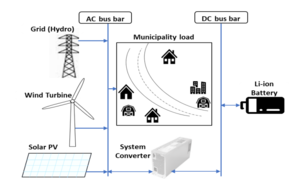
The development of 100% renewable electricity (RE) systems play a pivotal role in ensuring climate stability. Many municipalities blessed with wealth, an educated and progressive citizenry, and large RE resources, have already reached 100% RE generation. Impoverished municipalities in unwelcoming environments both politically and climatically (e.g., northern latitudes with long, dark winter conditions) appear to be incapable of transitioning to renewables. This study challenges that widespread assumption by conducting a detailed technical and economic analysis for three representative municipalities in the Western Upper Peninsula of Michigan. Each municipality is simulated with their own hourly electricity demand and climate profiles using an electrical supply system based on local wind, solar, hydropower, and battery storage. Sensitivities are run on all economic and technical variables. Results show that transition to 100% RE is technically feasible and economically viable. In all baseline scenarios, the 100% RE systems produced a levelized cost of electricity up to 43% less than the centralized utility rates, which are predominantly fueled by gas and coal. Current policies, however, prevent such self-sufficient systems from being deployed, which are not only detrimental to the global environment, but also aggravate the economic depression of such regions. Potential energy savings advance the prohibitive energy justice principle.
See also[edit | edit source]
Rural Renewable Energy
- A Free and open-source microgrid optimization tool: SAMA the Solar Alone Multi-Objective Advisor
- Low emissions analysis platform model for renewable energy: Community-scale case studies in Nigeria
- Demonstration of the integrated rural energy planning framework for sustainable energy development in low-income countries: Case studies of rural communities in Nigeria
- Decentralized Renewable Hybrid Mini-Grids for Rural Communities: Culmination of the IREP Framework and Scale up to Urban Communities
- Economic viability of captive off-grid solar photovoltaic and diesel hybrid energy systems for the Nigerian private sector
- Simulations of Greenhouse Gas Emission Reductions from Low-Cost Hybrid Solar Photovoltaic and Cogeneration Systems for New Communities
PV Systems in the UP
- Economics of Grid-Tied Solar Photovoltaic Systems Coupled to Heat Pumps: The Case of Northern Climates of the U.S. and Canada
- Decarbonizing rural residential buildings in cold climates: A techno-economic analysis of heating electrification
- Policies to Overcome Barriers for Renewable Energy Distributed Generation: A Case Study of Utility Structure and Regulatory Regimes in Michigan
- Emerging economic viability of grid defection in a northern climate using solar hybrid systems
- The Potential for Grid Defection of Small and Medium Sized Enterprises Using Solar Photovoltaic, Battery and Generator Hybrid Systems
- Can grid-tied solar photovoltaics lead to residential heating electrification? A techno-economic case study in the midwestern U.S.




